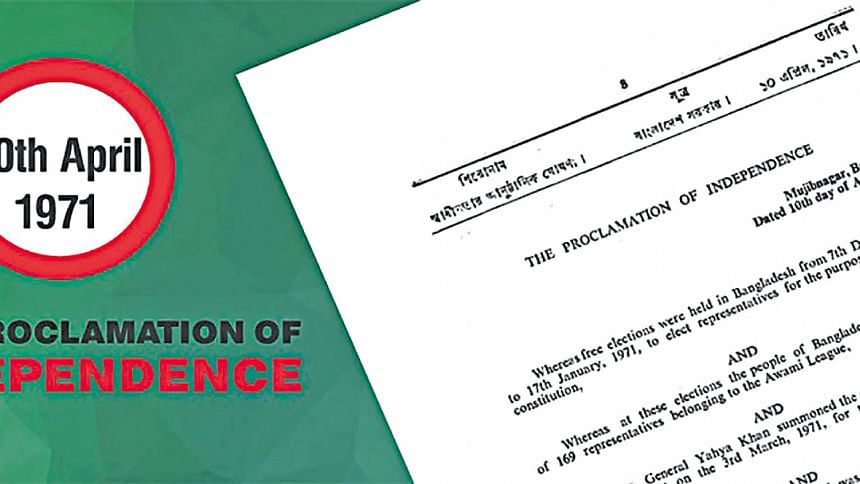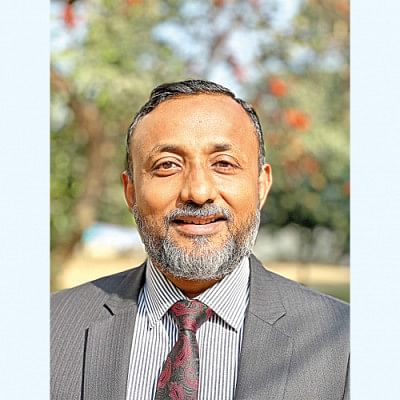The Proclamation of Independence 1971


Dr. Muhammad Ekramul Haque is a Professor of Constitutional Law and Comparative Constitutional Law at the Department of Law, University of Dhaka, of which he is also an alumnus. He did his PhD in Constitutional Law and International Law at Monash University in Melbourne, Australia. Dr. Haque is one of the leading scholars in the fields of constitutional law and comparative constitutional law in Bangladesh, and his contributions focus on how comparative constitutional experience and international law reflect and help shape the understanding and developing contents of Bangladeshi constitutional provisions and their interpretations. He is a member of the Research Group on "Cross-Judicial Fertilization: The Use of Foreign Precedents by Constitutional Judges", International Association of Constitutional Law (IACL) and the International Society of Public Law ICON•S. His most recent publication includes Encyclopedia of Public International Law in Asia (BRILL NIJHOFF, 2021), in which he served as the State Volume Editor for Bangladesh. Currently, he is writing one monograph and co-editing two books which will be published later this year, namely International Encyclopedia of Constitutional Law (Kluwer Law International), and The Constitutional Law of Bangladesh: Progression and Transformation at its 50th Anniversary (Springer Australia) and Implementation of Sustainable Development in the Global South: Strategies, Innovations and Challenges (HART Publishing UK) respectively. On the 52nd anniversary of the adoption of the Proclamation of Independence, the Law Desk spoke with him on the following issues:
Law Desk (LD): What role do you think the Proclamation of Independence (POI) played in the liberation war of 1971?
Muhammad Ekramul Haque (MEH): The promulgation of such a well-drafted unilateral declaration of independence (UDI) provided Bangladesh with an international legal contour to its emergence as a new state. The significance of the POI which was adopted on 10 April 1971 is manifold in the liberation struggle of Bangladesh. First and foremost, it created the entire legal framework for the liberation war and stands as the first constitution of Bangladesh. Secondly, with its retrospective effect, it reiterated the point that the liberation war did indeed begin on 26 March and since then there was a sovereign government. Thirdly, it fulfilled the remaining elements of statehood under traditional political science, namely government and sovereignty. Fourthly, it highlighted that Bangladesh was exercising its legitimate right of self-defence against the unjust and treacherous war waged against its people. Fifthly, it highlighted the continuous genocide being committed and in particular the atrocities committed on 25 March, which alone is enough to prove under international law that Pakistan committed genocide. Sixthly, it emphasised the fact that we were exercising our legitimate right to self-determination and self-defence. Finally, it talked about having established effective control over the territory of Bangladesh, which is one of the key requirements for a legitimate government in international law.
LD: What is the importance of the POI in connection with Bangabandhu's declaration of independence?
MEH: The connection can be clarified in 3 key-points. First, the 6th paragraph of the POI recognises the declaration made on March 26 and acknowledges that the struggle for liberation did not begin from 10 April. Secondly, the reason the POI itself is important is that it formalised Bangabandhu's declaration of independence on 26 March. Lastly, it is a unique UDI because, amongst other reasons, it highlighted the point of effective control for the Mujibnagar government in-exile.
LD: Would you comment on the historical context in which the POI was drafted?
MEH: The advent of Bangladesh by the exercise of the right to self-determination through the making of UDI was distinctive in nature back in 1971. Till then, the right to self-determination was more commonly used in the context of decolonisation. On the other hand, Bangladesh took a pioneering step and exercised this right to achieve its independence. Prior to this, there was no instance of successfully claiming the right to self-determination in a non-colonial setup for independence. In this regard, the example of Bangladesh has contributed to the development of the jurisprudence of international law.
LD: How is a document like the POI treated in international law? Do you think it reflected the relevant principles of international law?
MEH: The ICJ's advisory opinion regarding the UDI in respect of Kosovo has only recently decided on the legality of the UDI. As for principles of international law, principles of self-determination, the right of self-defence, the UDI, amongst others, are all well-reflected in our POI. However, it is unfortunate that despite contributing to the development of the jurisprudence of such principles, the example of Bangladesh is hardly mentioned by scholars.
LD: Do you think the 1972 Constitution fully reflects the values espoused in the POI?
MEH: Generally, the answer would be in the affirmative. First, the source of the supreme power in both documents has been given to the solemn will of the people. Article 7(2) of the Constitution, which enunciates this point is considered to be the polestar of the constitution. Secondly, the fact that lawmakers have to be elected in order to be legitimate has been reflected in both documents. Thirdly, the values of equality, human dignity, and social justice enshrined in paragraph 12 of the POI are also enunciated in the preamble of the 1972 Constitution. Fourthly, the value of free choice mentioned under article 25(b) of the Constitution was essentially the basis of the POI. Fifthly, the value of supporting oppressed people under article 25(c) further corresponds with the main idea behind the POI. However, one facet where the constitution did not fully reflect the POI would be in the realm of international law obligations, where the POI proved to incorporate a kind of blank cheque towards its intentions to apply international law and on the other hand the Constitution applied a more restrained version of this ideology through a limited perspective in article 25.
LD: How do you think the POI reflected the will of the people of Bangladesh?
MEH: The POI was not merely a creation of skillful draftsmen but rather a reflection of the will of the people. The first evidence of this connection can be found in the 10th paragraph of the POI where it is mentioned that the mandate of the Mujibnagar government was given by the people whose will is supreme. And secondly, the 4th paragraph from bottom of the POI again highlights the fact that the members of the Mujibnagar government were all duly elected and thus reflected the will of the people.
LD: Many thanks for talking to us.
MEH: You are welcome, and thanks are also due to The Daily Star for showing interest to discuss about the POI, which I think will create newer scopes for developing newer ideas in the constitutional law study of Bangladesh.
(We gratefully acknowledge Barrister M. Amir-ul Islam for making the draft of the POI.)

 For all latest news, follow The Daily Star's Google News channel.
For all latest news, follow The Daily Star's Google News channel. 



Comments